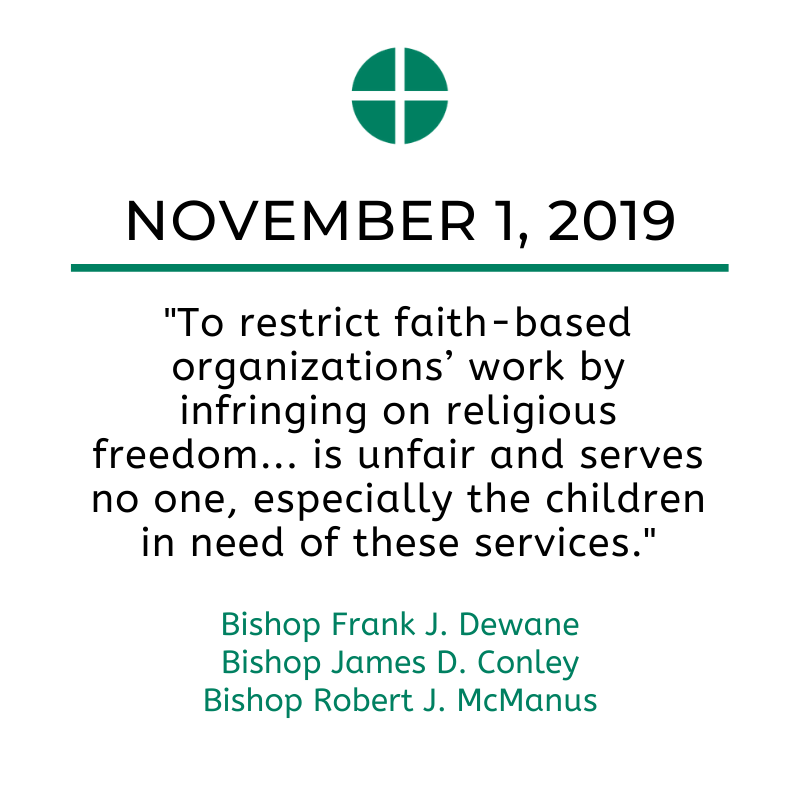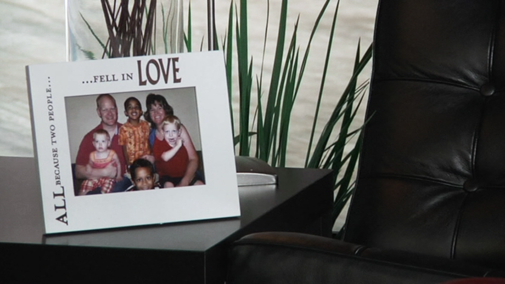Press Release: USCCB Bishop Chairmen Commend Administration Action
Bishop Chairmen Commend Administration Action to Prevent Government Discrimination Against Faith-based Adoption, Foster Care, and Social Service Providers
WASHINGTON—Bishop Frank J. Dewane of Venice, Chairman of the Committee on Domestic Justice and Human Development, Bishop James D. Conley of Lincoln, Chairman of the Subcommittee for the Promotion and Defense of Marriage, and Bishop Robert J. McManus of Worcester, Chairman of the Committee for Religious Liberty, have issued a statement commending a proposed rule change that will help ensure faith-based social service providers will not be excluded from certain federally-funded programs at the U.S. Department of Health and Human Services (HHS).
Their joint statement follows:
“We commend the Administration for acting to change a 2016 regulation that threatened to shut out faith-based social service providers, namely adoption and foster care agencies that respect a child’s right to a mother and a father. To restrict faith-based organizations’ work by infringing on religious freedom – as the 2016 rule threatened to do – is unfair and serves no one, especially the children in need of these services. We are alarmed and saddened that state and local government agencies in multiple jurisdictions have already succeeded in shutting down Catholic adoption and foster care agencies as a result of their Catholic beliefs. At a time when over 400,000 children are in foster care, we need to take steps to increase – not decrease – their opportunities to be placed with safe and loving families. We welcome today’s proposed rule modifications and look forward to reviewing and commenting on them further.”
Archive
Losses in Foster Care and Adoption Services
After 95 years of offering adoption and foster care services, Catholic Charities in Buffalo, NY had to end their participation, since they seek to place children with married mothers and fathers.
And the U.S. Supreme Court refused to grant an injunction to allow Catholic foster care and adoption agencies to continue operating in Philadelphia, PA for the same reason.
Let us pray for the freedom to serve to be restored to our charities!
Archive
U.S. Bishops’ Chairmen Applaud KS and OK Laws
See last week’s press release about the Kansas and Oklahoma laws that keep Catholic (and other) adoption and foster care agencies in service!
U.S. Bishops’ Chairmen Applaud Kansas and Oklahoma for Enacting Laws that Keep Kids First in Foster Care and Adoption Services (May 18, 2018)
Archive
Oklahoma Bishops Praise Protections for Adoption Agencies
The Governor of Oklahoma recently signed into law a bill that protects faith-based adoption and foster care agencies that continue to hold that children deserve to be placed in homes with both a mother and a father. The Bishops of Oklahoma have praised this upholding of religious freedom in the state.
Archive
Made for Love Ep 7: Love in Adoption
Kate was pregnant and in shock. Deborah, Elizabeth, Bethany, and their respective husbands, all felt an ache that their arms were empty after years of hoping for a child. This episode highlights the gift of adoption and its complexity in real life.
And don’t forget Kelli’s testimony about adoption:
And Peter Range:
Archive
The Gift of Adoption
In this clip, Kelli Wild speaks about her work with couples who choose to entrust their children to the adoption process. She says that it is not an easy path, and that it must be “laced in love.”
It may not be possible for someone who has never gone through it to truly understand a woman’s experience when she gives her child to another couple to raise, but empathy can go a long way.
One of the things that we can learn to do as a culture is to honor this choice and to be conscious of our language about it. The phrase that was traditionally used was that a woman “gave up” her baby to adoption, while the phrase that perhaps better captures the truth is that she “gave her baby to” a couple to raise, when she knew that she was not able to do so. That is an expression of the authentic love of a mother—willing to bear all the uncomfortable and painful moments of pregnancy and birth for the sake of her child, even though she will not enjoy the consolation of their smiles, giggles, or “I love you, mom” in future years.
While we should always support a woman who is committed to mothering her child on her own, if the circumstances demand it, we should also rightly honor the gift a birth mother gives when she chooses adoption.
Archive
Made for Freedom: Peter Range on Adoption
Peter Range shares a bit of his experience in adoption ministry in today’s clip:
Peter talks about a child being “grafted into a family with a mother and a father.” When you choose to “graft” something on to something else, you want to make sure that the thing you are grafting onto is healthy and robust. In gardening, grafting is done to strengthen the plant, to give it the best chance of surviving. In adoption, a birth mother is placing her child lovingly into the arms of those she believes and trusts will give her child the best chance at thriving.
As Peter notes, when an agency is looking to place a child into a new “forever” home, they are looking for the best environment for the child; they would not want to place a child into a home that is lacking a fundamental element that the child needs, or that features something that child should not be exposed to. (As a simple example, an adoption agency would not be doing its job well if they placed a child with severe pet allergies into a home where the parents have 3 dogs and 5 cats!) In this way, Catholic adoption agencies seek to place children in homes with married couples, whenever possible. This is so that the child will grow up with a mother and a father; a man and woman who will step in to offer the child what their natural mother and father could not.
Opportunity
Consider the experience of adoption and the testimony of adopted children to their interest, or lack thereof, in meeting their birth parents. How can the Church accompany these children and their parents?
Archive
Made for Life, Part 5: "We were open to life, whether through…giving birth or through the adoption process."
Background: This is part 5 of the Viewer’s Guide that accompanies the video “Made for Life.” Previous sections include: 1) openness to life; 2) gift of self and gift of life; 3) children as a gift; 4) the call to welcome a child and be a child. In part 5, we’ll look at the witness of infertile couples and of those couples who adopt a child. In that context, we’ll reflect on how openness to life is essential for all marriages, not just those that are blessed with children.

“We were open to life, whether through…giving birth or through the adoption process.”
As Kevin and Brenda witness in the video, openness to life has a meaning more profound than popularly recognized today. In the midst of recent attempts to “redefine” marriage, the objection is sometimes raised that there are many husbands and wives who are unable to have children. What makes them different from a relationship between two persons of the same sex, who also can’t have children of their own?
The truth is, there is an unbridgeable difference between a spousal union (a male-female couple united as husband and wife) and a relationship between two men or two women. This difference is sexual difference. First, conceiving a child requires the joint action of both a man and a woman. This intimate participation in conceiving a child is simply impossible for two persons of the same sex. Two men or two women cannot—ever—have a child together. [i]
Second, sexual union between a husband and wife is the kind of union apt for generation. That is, male-female intimacy is the natural route through which a child comes into the world. There are times when a husband and wife may be unable to conceive a child due to infertility or sterility (for reasons beyond their control) or advanced age. Still, their sexual union remains the kind of union that expresses total self-gift and openness to the gift of the child. [ii] The situation is very different for two persons of the same sex. Even if both are young and perfectly healthy, any sexual behavior between them can never form a true union and will never be able to welcome a new child into the world.
The painful cross of infertility does not mean that a couple’s marriage is not fruitful. As Pope John Paul II taught, “Physical sterility . . . can be for spouses the occasion for other important services to the life of the human person, for example, adoption, various forms of educational work, and assistance to other families and to poor or handicapped children.” [iii] In particular, the Church praises adoption as an expression of “true parental love,” which “is ready to go beyond the bonds of flesh and blood in order to accept children from other families.” [iv]
Adoption, as a response to a tragedy or loss, is never meant to be held up as an “alternative” to the natural family of father, mother, and their children. Instead, adoption “takes its form” from the natural family. There is a difference between generously responding to an abandoned child’s need for a mother and a father, on the one hand, and deliberately depriving a child of a mother and a father by placing him or her in the care of two men or two women.
In sum, openness to life is essential to every marriage. Husbands and wives who are not blessed with children of their own still exemplify the fruitful communion of persons in a way two persons of the same sex never can. This communion, built on the sexual difference between husband and wife, opens the door to adoption and to other generous forms of service while still respecting the beauty of sexual difference, the needs of children, and the indispensable place of mothers and fathers.
Archive
Sunday Pope Quote: Bl. John Paul II on the fruitfulness of married love
Today’s Sunday Pope Quote comes from Bl. John Paul II’s apostolic exhortation Familiaris Consortio (The family in the modern world). Here he is discussing what it means for married love to be fruitful…and it might surprise you how truly wide and deep this concept is!
Bl. John Paul II: “Fruitful married love expresses itself in serving life in many ways. Of these ways, begetting and educating children are the most immediate, specific and irreplaceable. In fact, every act of true love toward a human being bears witness to and perfects the spiritual fecundity of the family, since it is an act of obedience to the deep inner dynamism of love as self-giving to others.
“For everyone this perspective is full of value and commitment, and it can be an inspiration in particular for couples who experience physical sterility.
“Christian families, recognizing with faith all human beings as children of the same heavenly Father, will respond generously to the children of other families, giving them support and love not as outsides but as members of the one family of God’s children.
. . .
“Family fecundity must have an unceasing ‘creativity,’ a marvelous fruit of the Spirit of God, who opens the eyes of the heart to discover the new needs and sufferings of our society and gives courage for accepting them and responding to them.”
– Familiaris Consortio, no. 41